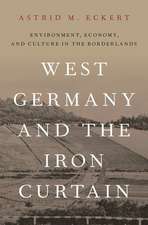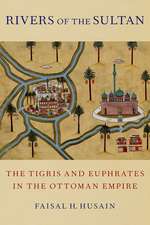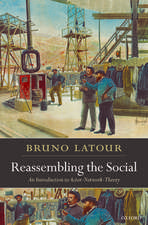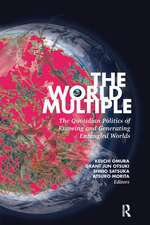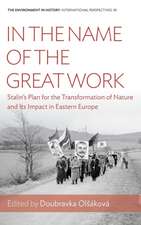Panda Nation: The Construction and Conservation of China's Modern Icon
Autor E. Elena Songsteren Limba Engleză Paperback – 17 iul 2020
A logo on products ranging from chopsticks and toilet paper to cell phones and automobiles, the panda is one of the most ubiquitous images in China and throughout the world. Yet the panda holds little notable historical significance in China. Although it has existed in the territory of present-day China since the Pliocene epoch, its widespread popularity there is not only recent, but almost sudden.In Panda Nation, E. Elena Songster links the emergence of the giant panda as a national symbol to the development of nature protection in the People's Republic of China. The panda's transformation into a national treasure exemplifies China's efforts in the mid-twentieth century to distinguish itself as a nation through government-directed science and popular nationalism. The story of the panda's iconic rise offers a striking reflection of China's recent and dramatic ascent as a nationin global status.
| Toate formatele și edițiile | Preț | Express |
|---|---|---|
| Paperback (1) | 159.99 lei 10-16 zile | |
| Oxford University Press – 17 iul 2020 | 159.99 lei 10-16 zile | |
| Hardback (1) | 395.06 lei 31-37 zile | |
| Oxford University Press – 17 mai 2018 | 395.06 lei 31-37 zile |
Preț: 159.99 lei
Preț vechi: 179.93 lei
-11% Nou
30.62€ • 33.25$ • 25.72£
Carte disponibilă
Livrare economică 21-27 martie
Specificații
ISBN-10: 0197533574
Pagini: 266
Ilustrații: 27 hts
Dimensiuni: 152 x 231 x 15 mm
Greutate: 0.36 kg
Editura: Oxford University Press
Colecția OUP USA
Locul publicării:New York, United States
Recenzii
Songster's much anticipated book Panda Nation: The Construction and Conservation of China's Modern Icon admirably fills a gap in the historiography of China's environment by tracing the giant panda's post-1949 emergence as a Chinese national icon and a global symbol of wildlife conservation...Songster's book...will reward anyone, from undergraduates to senior scholars, with an interest in how the panda gained its iconic status, and how that story relates to modern Chinese history more generally.
By choosing instead to tell the multi-faceted story of how humans constructed and conserved this particular species, Songster is able to speak to a much wider audience interested in China's political, social, cultural and environmental history. To all of them, and in fact to readers looking for an unusual entry into modern Chinese history per se, Panda Nation can be highly recommended.
How did the giant panda, a shy creature rarely seen in the wild, not hunted for meat, and all but missing from historical texts, come to serve as a political tool for China's national pride, international diplomacy, and soft power projection? In answering this question, Songster draws on cultural history, archives, field research in Pingwu, news articles, scientific monographs, and interviews with some of the pioneers of giant panda biology and conservation.
Even those immune to the supposed charms of this charismatic megafauna must acknowledge the panda's place at the pinnacle of both Chinese national symbolism and international relief efforts. Songster's accessible and well-organized account historicizes this phenomenon at both a local and global scale, making it essential reading for scholars of ecotourism, Chinese environmental history, and diplomatic history ... The book would be quite suitable for a non-China specialist or an undergraduate environmental history course.
Demonstrates that conservation history of the giant panda has been shaped not only by science and research, but also, and maybe more significantly, by political, economic, and sociocultural factors. The book will serve well in environmental history, international conservation, and China studies classes ... Recommended. Upper-division undergraduates through faculty and professionals.
In this delightfully crafted study, Songster reveals how the cuddly panda
Songster has written a captivating chronicle of how the giant panda has become more than just an endangered species known for its attractiveness. This compelling history reveals the prominent role the giant panda, as both symbol and living creature, has played as a national icon and as a tool of diplomacy in the construction of a modern Chinese identity and in the development of science and nature protection in the People's Republic of China. Panda Nation is an engaging read that fills gaps in the fields of environmental history, environmental studies, and Chinese studies.
Panda Nation is an impressive achievement. Based on extensive research, it offers a compelling account of the rise of a national icon and star of global conservation. The book will be widely noticed and read by scholars in animal studies, Chinese history, history of science, and environmental studies, but is accessible enough that non-academics can read it with ease.
Want a readable, fast-moving account of modern Chinese history? It would be hard to do better than Elena Songster's Panda Nation. This account of how people have seen and used pandas touches engagingly on almost every facet of the history of the People's Republic: imperialism and colonialism, socialist science, Soviet influence, environmental conservation, resource exploitation, national pride, relations between central and local bureaucracy, attitudes toward ethnic minorities, the incompleteness of the Cultural Revolution, modern uses of traditional art forms, the documentary film industry, symbolic diplomacy, consumerism and tourism, individual agency in a bureaucratic state, even Taiwan's political status.
In this gracefully written and deeply researched book, E. Elena Songster places the iconic giant panda at the center of a fascinating story weaving together threads of China's modern history, the drama of science and environmental protection in the People's Republic of China, the formation and projection of China's nationalist identity, and the use of the panda to further China's international objectives, all the while never losing sight of the panda as a biologically unique wild animal threatened both by its place in a particular ecosystem marked by natural cycles of periodic bamboo die-off, by the rapid pace of industrialization and population growth in the second half of the twentieth century, and by the vicissitudes of politics in China and the world. This book anchors China and its human institutions in the natural world, illuminating the surprising place of the giant panda in the story of modern China.
Notă biografică
E. Elena Songster is Associate Professor of History at St. Mary's College of California.

